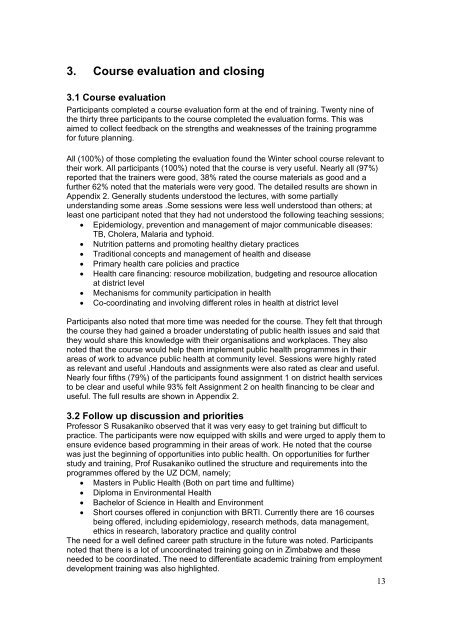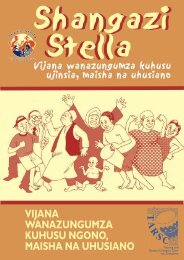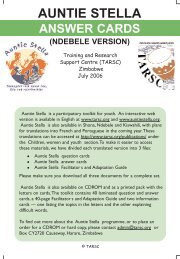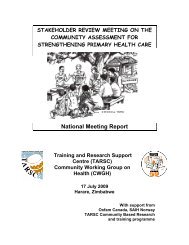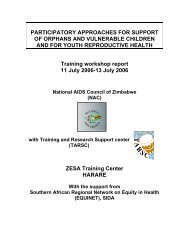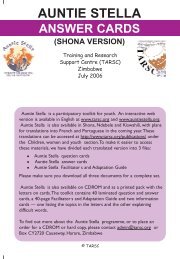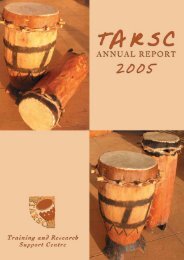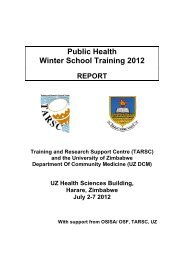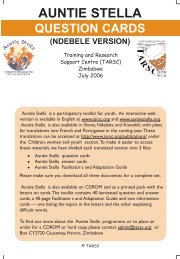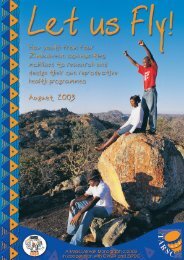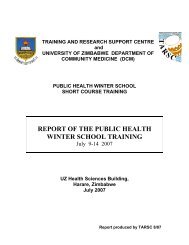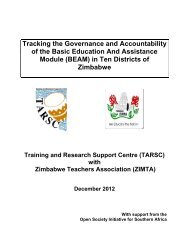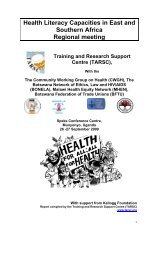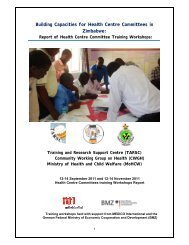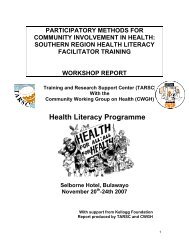WS10 Report.pdf - Training and Research Support Centre
WS10 Report.pdf - Training and Research Support Centre
WS10 Report.pdf - Training and Research Support Centre
Create successful ePaper yourself
Turn your PDF publications into a flip-book with our unique Google optimized e-Paper software.
3. Course evaluation <strong>and</strong> closing<br />
3.1 Course evaluation<br />
Participants completed a course evaluation form at the end of training. Twenty nine of<br />
the thirty three participants to the course completed the evaluation forms. This was<br />
aimed to collect feedback on the strengths <strong>and</strong> weaknesses of the training programme<br />
for future planning.<br />
All (100%) of those completing the evaluation found the Winter school course relevant to<br />
their work. All participants (100%) noted that the course is very useful. Nearly all (97%)<br />
reported that the trainers were good, 38% rated the course materials as good <strong>and</strong> a<br />
further 62% noted that the materials were very good. The detailed results are shown in<br />
Appendix 2. Generally students understood the lectures, with some partially<br />
underst<strong>and</strong>ing some areas .Some sessions were less well understood than others; at<br />
least one participant noted that they had not understood the following teaching sessions;<br />
Epidemiology, prevention <strong>and</strong> management of major communicable diseases:<br />
TB, Cholera, Malaria <strong>and</strong> typhoid.<br />
Nutrition patterns <strong>and</strong> promoting healthy dietary practices<br />
Traditional concepts <strong>and</strong> management of health <strong>and</strong> disease<br />
Primary health care policies <strong>and</strong> practice<br />
Health care financing: resource mobilization, budgeting <strong>and</strong> resource allocation<br />
at district level<br />
Mechanisms for community participation in health<br />
Co-coordinating <strong>and</strong> involving different roles in health at district level<br />
Participants also noted that more time was needed for the course. They felt that through<br />
the course they had gained a broader understating of public health issues <strong>and</strong> said that<br />
they would share this knowledge with their organisations <strong>and</strong> workplaces. They also<br />
noted that the course would help them implement public health programmes in their<br />
areas of work to advance public health at community level. Sessions were highly rated<br />
as relevant <strong>and</strong> useful .H<strong>and</strong>outs <strong>and</strong> assignments were also rated as clear <strong>and</strong> useful.<br />
Nearly four fifths (79%) of the participants found assignment 1 on district health services<br />
to be clear <strong>and</strong> useful while 93% felt Assignment 2 on health financing to be clear <strong>and</strong><br />
useful. The full results are shown in Appendix 2.<br />
3.2 Follow up discussion <strong>and</strong> priorities<br />
Professor S Rusakaniko observed that it was very easy to get training but difficult to<br />
practice. The participants were now equipped with skills <strong>and</strong> were urged to apply them to<br />
ensure evidence based programming in their areas of work. He noted that the course<br />
was just the beginning of opportunities into public health. On opportunities for further<br />
study <strong>and</strong> training, Prof Rusakaniko outlined the structure <strong>and</strong> requirements into the<br />
programmes offered by the UZ DCM, namely;<br />
Masters in Public Health (Both on part time <strong>and</strong> fulltime)<br />
Diploma in Environmental Health<br />
<br />
<br />
Bachelor of Science in Health <strong>and</strong> Environment<br />
Short courses offered in conjunction with BRTI. Currently there are 16 courses<br />
being offered, including epidemiology, research methods, data management,<br />
ethics in research, laboratory practice <strong>and</strong> quality control<br />
The need for a well defined career path structure in the future was noted. Participants<br />
noted that there is a lot of uncoordinated training going on in Zimbabwe <strong>and</strong> these<br />
needed to be coordinated. The need to differentiate academic training from employment<br />
development training was also highlighted.<br />
13


